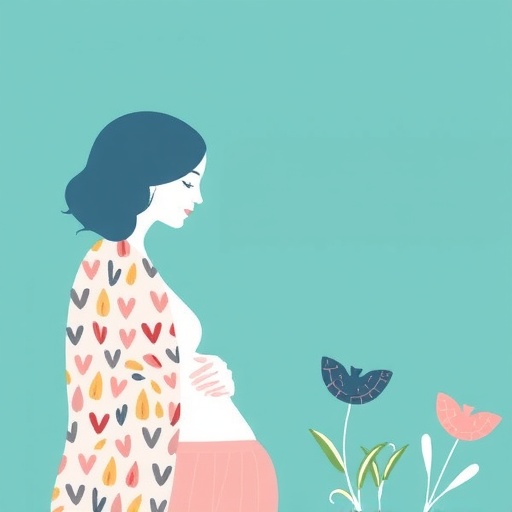Postpartum mental health has emerged as a critical area of focus in maternal health research, with significant implications for both mothers and their families. A recent scoping study sheds light on the complexities surrounding postpartum mental health issues and highlights the pressing need for tailored interventions. This research encapsulates the multifaceted nature of mental health challenges experienced by new mothers, emphasizing the importance of understanding the associated factors that contribute to these conditions.
The postpartum period is often described as one of the most transformative stages in a woman’s life, yet it can also be accompanied by a range of psychological challenges. Many new mothers report feelings of anxiety, depression, and mood changes during this critical time. These experiences can profoundly impact not only the mother’s well-being but also the early parent-child relationship and the family dynamics. The findings of this study indicate that these mental health issues are not merely transient but can lead to long-term consequences if left unaddressed.
Factors influencing postpartum mental health are varied and complex. The study identified several critical determinants, including hormonal fluctuations, social support, economic stability, and individual mental health history. Each of these elements plays an integral role in shaping a woman’s emotional landscape after childbirth. Furthermore, cultural perceptions and societal expectations surrounding motherhood can either mitigate or exacerbate these challenges, introducing another layer of complexity to postpartum mental health issues.
The scoping study emphasizes the necessity for comprehensive research that goes beyond merely identifying the prevalence of postpartum mental health problems. Understanding the nuanced interplay of various factors can enable healthcare providers to create more effective, targeted support systems for new mothers. It is not enough to recognize that postpartum mental health disorders exist; there is a dire need to understand why they occur and how they can be prevented or treated.
In addition to recognizing the factors at play, the study suggests that healthcare policies must evolve to accommodate the mental health needs of new mothers. Traditional maternal care has often focused primarily on physical health, leaving mental health concerns under-addressed. This gap in healthcare has prompted calls for an integrated approach that includes mental health screenings as a standard component of postpartum care routines.
An important aspect of this research is its advocacy for increased awareness and training among healthcare professionals. Many practitioners may lack the knowledge or skills necessary to identify and respond to postpartum mental health issues effectively. Consequently, enhancing education around these disorders can empower healthcare providers to offer compassionate, informed care that prioritizes the emotional well-being of mothers as part of the standard postpartum experience.
Moreover, the social stigma associated with mental health problems remains a significant barrier to seeking help. Many women may feel hesitant to disclose their mental health struggles due to fear of judgment or misunderstanding. Therefore, public health campaigns aimed at normalizing discussions around postpartum mental health are vital. By fostering open conversations, we can create a supportive environment where mothers feel safe to seek assistance and reassurance.
The study also highlights the role of family dynamics in postpartum mental health. Involvement from partners and family members can serve as a protective factor, helping to alleviate some of the pressures new mothers face. Encouraging supportive family structures can foster a nurturing environment that promotes better mental health outcomes. This underscores the importance of involving partners in prenatal education, so they are better equipped to assist their partners during the postpartum transition.
Another critical area the research explores is the integration of technology in addressing postpartum mental health issues. With the rise of telehealth and digital mental health resources, new avenues for support are becoming more accessible. These tools can offer convenient and immediate assistance to mothers who might be reluctant to seek traditional in-person care. However, it’s essential to ensure that these digital solutions are evidence-based and tailored to the unique needs of postpartum individuals.
Overall, the insights from this scoping study present a call to action for researchers, healthcare providers, and policymakers alike. There is a clear need for collaborative efforts aimed at addressing the complexities of postpartum mental health through research, improved healthcare practices, and public awareness campaigns. Only by adopting a holistic approach can we hope to mitigate the impact of postpartum mental health disorders and support mothers in this critical phase of their lives.
In conclusion, as our understanding of postpartum mental health continues to evolve, so too must our strategies to support mothers. The findings from this scoping study serve as a foundation for future research and intervention efforts, paving the way for more informed practices that prioritize the psychological well-being of new mothers. Addressing postpartum mental health is not just a medical issue; it is a societal responsibility that requires collective action.
Subject of Research: Postpartum mental health issues and associated factors.
Article Title: A scoping study of postpartum mental health problems and associated factors: opportunities for research and practice.
Article References:
Ojomo, O., Atibioke, O., Alesinloye-King, O. et al. A scoping study of postpartum mental health problems and associated factors: opportunities for research and practice.
Discov Ment Health 5, 136 (2025). https://doi.org/10.1007/s44192-025-00278-3
Image Credits: AI Generated
DOI: 10.1007/s44192-025-00278-3
Keywords: postpartum mental health, maternal health, mental health disorders, healthcare, social support, family dynamics, stigma, digital health, telehealth, research, interventions.




